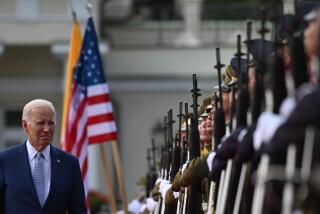Soviet Plan ‘Broadly’ Acceptable, Shultz Says
- Share via
BRUSSELS — Secretary of State George P. Shultz said today that the new Soviet proposal for scrapping nuclear missiles in Europe is “broadly” acceptable for NATO, but European allies had a more cautious assessment.
Shultz briefed alliance officials for about 90 minutes on his three days of talks in Moscow with Kremlin leaders, which he said created a “great opportunity” for arms control. He then flew home to report to President Reagan this evening.
European officials cheered Shultz’s efforts in Moscow but said that it is too soon to endorse the latest Soviet offer and that “intensive” consultations among the allies will be necessary.
The Soviets appeared to press for a quick answer. Foreign Ministry spokesman Gennady Gerasimov told a news briefing today in Moscow that “it would be very unfortunate if this process of consultations and discussion would lead to protracted negotiations.”
Hans van den Broek, foreign minister of the Netherlands, said: “Our approach must be: Think over your total strategy; don’t rush to any conclusion.”
Lord Carrington, secretary general of the North Atlantic Treaty Organization, said alliance experts will study the implications for Western security, including the relationship to conventional forces in Europe.
The NATO allies fear that ridding Europe of nuclear weapons would make them vulnerable to superior Soviet readiness for conventional war.
Shultz told reporters after his NATO consultations that the West will not give an “instant response” to Soviet leader Mikhail S. Gorbachev’s offer to dismantle short-range missiles deployed in East Germany and Czechoslovakia as part of an agreement to withdraw hundreds of U.S. and Soviet medium-range nuclear rockets from Europe.
He characterized the proposal as attractive to NATO, which for more than seven years has given high priority to freeing Western Europe of the threat created by Soviet SS-20 medium-range nuclear missiles.
“Now we have the prospect of an agreement that brings this whole pattern of Soviet deployments, which we objected to, back under control,” Shultz said. “From our standpoint that’s good. That’s what we’ve been trying to get to.” He said the Soviet offer is “broadly along the lines” of what NATO can accept.
More to Read
Sign up for Essential California
The most important California stories and recommendations in your inbox every morning.
You may occasionally receive promotional content from the Los Angeles Times.










